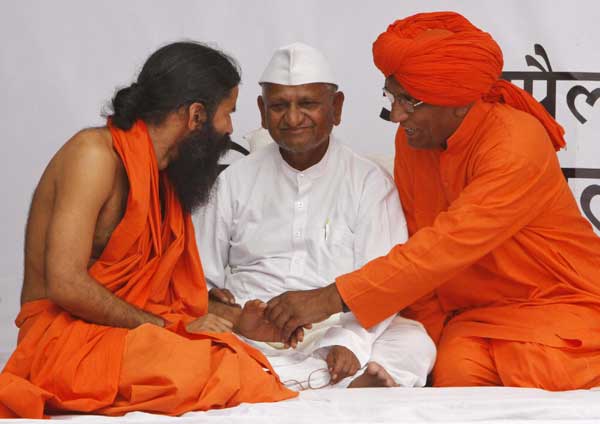Asia-Pacific
India yoga guru anti-graft fast gains momentum
(Xinhua)
Updated: 2011-06-02 14:53
 |
Large Medium Small |
NEW DELHI - India's government suffered a fresh blow on Thursday in containing growing anger over corruption from million of voters as a leading civil activist joined forces with an influential yoga guru in a "fast-until-death" against graft.
 India's yoga guru Swami Ramdev (L) speaks with social activist Swami Agnivesh as Anna Hazare (C) listens during a "fast unto death" campaign in New Delhi April 8, 2011. [Photo/Agencies] |
The saffron-robed Swami Ramdev, India's most famous yoga guru, has pledged a hunger strike from Saturday to protest corruption in Asia's third-largest economy and called on his legions of followers to join him.
Anna Hazare, whose highly-publicised fast in April rang a chord with millions of Indians and forced the government to make legislative concessions on an anti-corruption bill, pledged his support on Thursday for Ramdev's strike.
"The government has tried to cheat us," Hazare, whose hunger strike demanding the anti-corruption law triggered protests by thousands of people across India, told reporters.
"I will support Baba Ramdev so that the government does not do what it did when we were fighting. We will fight together against corruption."
Such is Ramdev's popularity that some of India's most powerful government ministers turned up at Delhi airport to greet Ramdev on Wednesday and persuade him to call off the strike. They failed, and were forced to carry out a second day of talks.
Even Prime Minister Manmohan Singh personally appealed to Ramdev, whose daily TV show attracts 30 million viewers in a country where the healing powers of yoga are hugely popular, to call off the protest.
Ramdev will begin his fast on Saturday in New Delhi and has predicted that 10 million people will join his protest until the government agrees to pass an anti-corruption law and set up a task force for repatriating illegal funds held in foreign bank accounts by Indians.
Singh's ruling Congress party has struggled to shake off a slew of corruption scandals, including a telecoms kickback scam that may have cost the government $39 billion, that have sparked public anger, hurt foreign investment and stymied economic reforms.
Hazare, who is in his 70s, ended his fast after five days when the government agreed to finalise a draft of the "Jan Lokpal" bill giving an independent ombudsman police-like powers to prosecute ministers, bureaucrats and judges.
Politicians fear that outrage over the corruption scandals, made all the harder to stomach by rising food and fuel prices, may turn into a national popular movement against the establishment.
India has largely remained unaffected by the violent protests that have rocked emerging economies in the Middle East and North Africa, fuelled in part by high prices and corruption.
India ranked 78th on Transparency International's latest corruption index. Graft has long been a part of daily life, but the scandals - that have seen ministers jailed and business heavyweights questioned - are unprecedented.
| 分享按钮 |